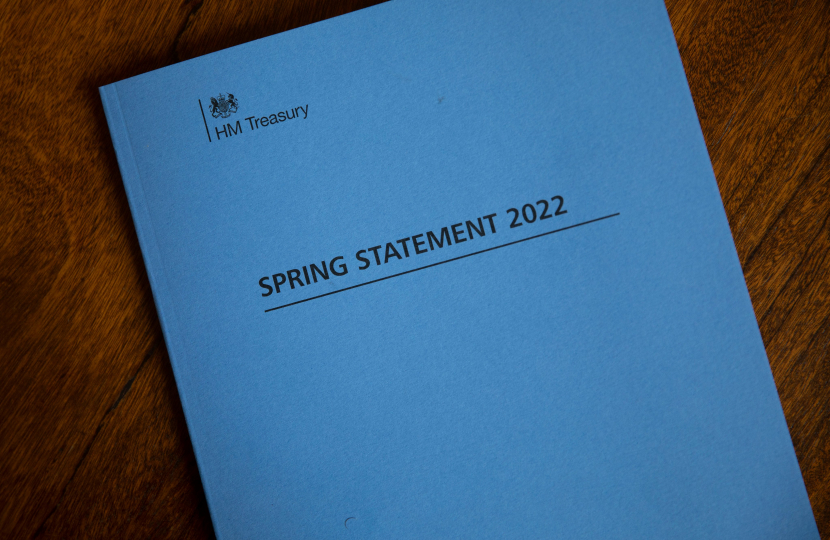
- The situation in Ukraine reminds us that the United Kingdom’s security and ability to be a force for good in the world is in large part because of the strength of the economy.
- But, the steps the United Kingdom are taking to sanction Russia are not cost free for people at home: the biggest impact will be for working families.
- In order to protect the progress made in our economic recovery and help families with the cost of living, the Chancellor is delivering a new Tax Plan to reduce and reform taxes over the course of this Parliament – helping working people and turbocharging economic growth.
- The tough but responsible decisions to fix public finances taken by this Conservative Government means that taxes are being cut, debt is falling and public spending is increasing.
Today, the Chancellor announced his new Tax Plan to reduce and reform taxes across the United Kingdom – tackling the cost of living and incentivising private sector-led growth.
People in Castle Point will benefit from the Conservative Government’s plan to deliver on the biggest cut to personal taxes in over a quarter of a century.
The IMF said the UK had the fastest growing economy in the G7 last year – today’s announcement from the Chancellor, Rishi Sunak, seeks to remain responsible on public spending and public finances to protect and increase this growth whilst helping families with the cost of living.
Measures set out by the Chancellor include reducing and reforming taxes by:
Helping Families with the Cost of Living with £22 Billion Next Year
- Slashing fuel duty by 5p for twelve months – a £5 billion tax cut for drivers together with the freeze. Conservative Governments have frozen fuel duty for twelve consecutive years. But in recognition of the unprecedented circumstances pushing up fuel prices, we are today cutting fuel duty by 5 pence for a full year – only the second cut in twenty years, the LARGEST EVER cut across all fuel duty rates, and a new tax cut itself worth £2.5 billion, adding up to over £5 billion together with the cost of the freeze. Together with our freeze, this will save car drivers £100, van drivers £200, and HGV drivers £1,500 this year. Furthermore, 40% of the cut will benefit businesses. And this will come into effect immediately from 6pm this evening, across the United Kingdom.

- The National Insurance personal threshold will rise from £9,500 to £12,570 from July. At Budget 2020, we increased the amount people can earn before paying National Insurance to £9,500. Today, we are going further by raising this threshold to £12,570 from July – the largest increase in a starting personal tax threshold in British history, equivalent to a £6 billion tax cut for nearly 30 million workers and worth over £330 a year starting in July, across the entire United Kingdom. This is the largest single personal tax cut in a decade. This simplification means that from July, people will be able to earn £12,570 a year without paying a single penny of income tax or national insurance.

- Scrapping VAT on energy saving materials – a £250 million tax cut for homeowners. Our current VAT relief for families installing energy saving materials like solar panels, heat pumps or insulation used to be more generous. But the European Court of Justice in 2019 forced us to add complex red tape which limited eligibility, removed certain items from qualifying, and restricts VAT relief to 5%. Now we have left the EU, we are using our Brexit freedoms to remove this 5% VAT charge over the next five years, reverse the EU’s decision to take wind and water turbines out of scope, and remove all the complex EU imposed red tape. This adds up to a £250 million tax cut for energy efficiency. A typical family installing roof top solar panels will save £1,000 on installation, and then £300 annually on their energy bills.

- Doubling the existing Household Support Fund to £1 billion. We are adding an additional £500 million to the Household Support Fund, which helps our most vulnerable families with the cost of living. The fund is distributed through local authorities in England, who have discretion over exactly how the funding is used. We expect it will benefit 3 to 4 million vulnerable households.

Creating the Conditions for Private Sector-Led Growth
- Capital: Capital investment by UK businesses is considerably lower than the OECD average of 14% – and accounts for half our productivity gap with France and Germany. Once the super-deduction ends next year, our overall tax treatment for capital investment will be far less generous than the OECD average. That is why we will cut the tax rates on business investment in the Autumn Budget.
- People: The UK lags international peers in adult technical skills – just 18% of 25-64-year-olds hold vocational qualifications, a third lower than the OECD average. And UK employers spend just half the European average on training their employees. So we will examine whether the current tax system (including the operation of the Apprenticeship Levy) is doing enough to incentivise employers to invest in the right kinds of training.
- Ideas: Over the last fifty years, innovation drove around half the UK’s productivity growth. But since the financial crisis, the rate of increase has slowed more than other countries – and our lower rate of innovation explains almost all our productivity gaps with the US. That is why we will reform R&D tax credits so they are more effective and better value for money, we will expand the scope of the reliefs, and we will consider whether to make R&D expenditure credit more generous.
- But we know small businesses need our help now, so today we are raising the employment allowance to £5,000 – a £1,000 tax cut for small businesses. The Employment Allowance cuts employers’ national insurance tax bills. At Budget 2020, we made it more generous. Today, as recommended by the Federation of Small Businesses, we are increasing the employment allowance even further to £5,000 from April – that’s a new £1,000 tax cut for half a million small businesses.

- This builds on other measures we are taking to help small and medium-sized businesses. Our 50% business rates discount for retail, hospitality and leisure businesses worth up to £110,000 will take effect in April – a tax cut for hundreds of thousands of small businesses worth £1.7 billion (£5,000 tax cut for a typical pub) and the largest single-year business rates tax cut for 30 years outside of the pandemic. We have also increased the Annual Investment Allowance to £1 million, providing full expensing for all SMEs. Our Help to Grow: Management scheme offers businesses generous government-subsidised mini-MBAs worth up to £8,000, and Help to Grow: Digital offers businesses 50% discounts on purchasing new software worth up to £5,000. Taken together, this is significant cash support for SMEs.
Sharing the Proceeds of Growth Fairly
- The knowledge that you can keep more of what you earn is a powerful incentive for people to work hard. And economic security for your family means keeping more of what you earn. That is why we will cut the basic rate of income tax to 19 pence in 2024. It would be irresponsible to do this today, but by 2024, inflation is forecast to be back under control, debt will be falling sustainably and the economy growing. We will therefore cut the basic rate of income tax by 1p, a tax cut worth £5 billion for over 30 million workers, pensioners and savers – only the second income tax cut in two decades and the first income tax cut for 16 years. This will be worth around £175 for a typical taxpayer.

Rebecca Harris MP said:
“The situation in Ukraine reminds us that the United Kingdom’s security and ability to be a force of good in the world is in large part based on the strength of our economy.
“That is why this Government is going further to strengthen our economy, publishing a new Tax Plan to reduce and reform taxes – including cutting fuel duty, cutting the basic rate of Income Tax and cutting National Insurance for 30 million working people – meaning people can keep more of what they earn.
“This Tax Plan delivers the biggest cut to personal taxes in over a quarter of a century – simplifying our system in the long-term whilst we deliver immediate relief for cost-of-living pressures.”
Chancellor of the Exchequer, Rishi Sunak said:
“It is only because this Conservative Government is taking the tough but responsible decisions that we can announce taxes are being cut and debt is falling.
“Today’s new Tax Plan will help families with the cost of living, create the conditions for private sector-led growth, and share the proceeds of growth fairly.
“We are delivering the biggest net cut to personal taxes in over a quarter of a century, and that is only possible because of the disciplined approach to public spending that only a Conservative government can provide.”
To view the Spring Statement in full, please visit: https://www.gov.uk/government/publications/spring-statement-2022-documents.
